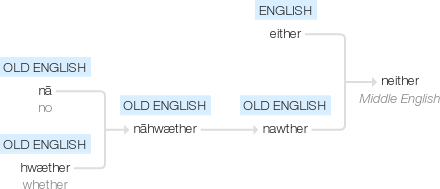Neither
Middle English: alteration (by association with either) of Old English nawther, contraction of nāhwæther (from nā ‘no’ + hwæther ‘whether’).
wiktionary
Alteration (after either) of nauther, from Middle English nawther, noþer, naðer (whence also Modern nor), from Old English nāwþer, contraction of nāhwæþer, corresponding to no + whether. Compare Latin neuter(“neither”).
etymonline
neither (conj., adv.)
"not one or the other," Middle English neither, naither, nether, from Old English nawþer, contraction of nahwæþer, literally "not of two," from na "no" (from PIE root *ne- "not") + hwæþer "which of two" (see whether). Spelling altered c. 1200 by association with either. Paired with nor from c. 1300; earlier with ne. Meaning "not in any case, in no case, not at all" is from 1550s. Also used in late Old English as a pronoun. As an adjective, "not either," mid-14c.
